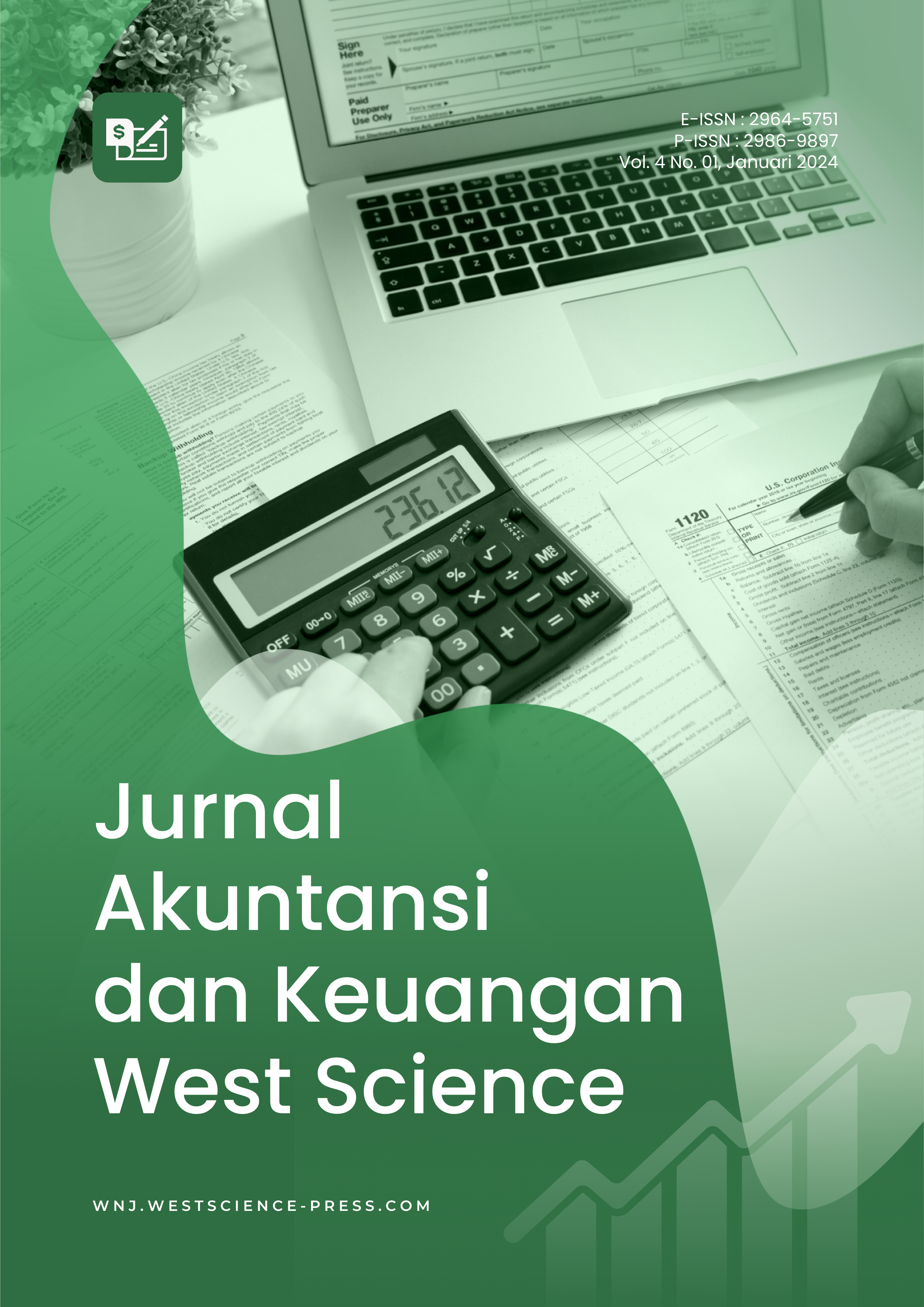Pengaruh Independensi Auditor terhadap Opini Audit pada Perusahaan Terdaftar di BEI
DOI:
https://doi.org/10.58812/jakws.v4i01.1941Kata Kunci:
Auditor Independence, Audit Opinions, Indonesia Stock Exchange, Unqualified Opinion, Quantitative AnalysisAbstrak
This study examines the effect of auditor independence on the issuance of audit opinions in companies listed on the Indonesia Stock Exchange (IDX). Using a quantitative approach with a sample of 38 auditors, data was collected through a Likert scale survey (1-5) and analyzed using SPSS version 25. The study investigates the relationship between auditor independence and audit opinions, focusing on the likelihood of issuing unqualified, qualified, adverse, and disclaimer opinions. The findings indicate a significant positive relationship between auditor independence and the issuance of unqualified opinions. Furthermore, a negative correlation was found between auditor independence and qualified opinions. The results highlight the importance of maintaining auditor independence to ensure unbiased and reliable audit opinions. This study contributes to the literature by providing insights into the dynamics of auditor independence and its impact on audit quality in the Indonesian context.
Referensi
Akuoko-Sarpong, R., Gyasi, S. T., & Affram, H. (n.d.). Audit Quality and its Determinants: Study the Factors that Influence Audit Quality, Including Auditor Independence, Firm Size, and Regulatory Environment. International Journal of Innovative Science and Research Technology (IJISRT).
Bordón, I. A. O., Garay, A. D. O., Esquivel, B. F., Gonzalez, H. D. C., & Páez, E. G. (2023). IMPACT OF THE AUDIT ON THE TRANSPARENCY AND DISCLOSURE OF FINANCIAL INFORMATION: AN ANALYSIS OF AN AUDITED COMPANY. Revista Gênero e Interdisciplinaridade, 4(05), 709–721.
Burritt, R. L., & Schaltegger, S. (2010). Sustainability accounting and reporting: fad or trend? Accounting, Auditing & Accountability Journal, 23(7), 829–846.
El-Helaly, M., Ntim, C. G., & Al-Gazzar, M. (2020). Diffusion theory, national corruption and IFRS adoption around the world. Journal of International Accounting, Auditing and Taxation, 38, 100305.
Fajriani, A., & Achmad, T. (2023). PENGARUH MANDATORY AUDITOR SWITCHING TERHADAP KUALITAS AUDIT. Diponegoro Journal of Accounting.
Hanjani, A., & Rahardja, R. (2014). Pengaruh Etika Auditor, Pengalaman Auditor, Fee Audit, dan Motivasi Auditor Terhadap Kualitas Audit (Studi pada Auditor KAP di Semarang). Diponegoro Journal of Accounting, 3(2), 111–119.
Hogan, C. E., Rezaee, Z., Riley Jr, R. A., & Velury, U. K. (2008). Financial statement fraud: Insights from the academic literature. Auditing: A Journal of Practice & Theory, 27(2), 231–252.
Houqe, M. N., Monem, R. M., & van Zijl, T. (2016). The economic consequences of IFRS adoption: Evidence from New Zealand. Journal of International Accounting, Auditing and Taxation, 27, 40–48.
Kamla, R., & G. Rammal, H. (2013). Social reporting by Islamic banks: does social justice matter? Accounting, Auditing & Accountability Journal, 26(6), 911–945.
Khalaf, A. Z., & Hamad, S. Ben. (2023). An exploratory and analytical study of a sample of control and audit professionals’ opinions on green audit techniques and methods. Revenue Journal: Management and Entrepreneurship, 1(1), 11–17.
Krida, A., & Pontjoharyo, W. (2024). Are Auditors Biased? The Effect of Anchoring and Adjustment Heuristics on Auditors’ Judgment. Journal of Accounting Research, Organization and Economics, 7(1), 58–76.
Lardo, A., Corsi, K., Varma, A., & Mancini, D. (2022). Exploring blockchain in the accounting domain: a bibliometric analysis. Accounting, Auditing & Accountability Journal, 35(9), 204–233.
Massaro, M., Dumay, J., & Guthrie, J. (2016). On the shoulders of giants: undertaking a structured literature review in accounting. Accounting, Auditing & Accountability Journal, 29(5), 767–801.
Nigrini, M. J. (2012). Benford’s Law: Applications for forensic accounting, auditing, and fraud detection (Vol. 586). John Wiley & Sons.
Nugrahanti, T. P. (2023). Analyzing the evolution of auditing and financial insurance: tracking developments, identifying research frontiers, and charting the future of accountability and risk management. West Science Accounting and Finance, 1(02), 59–68.
Nugrahanti, T. P., Sudarmanto, E., Bakri, A. A., Susanto, E., & Male, S. R. (2023). Pengaruh Penerapan Teknologi Big Data, Independensi Auditor, dan Kualitas Pelaporan Keuangan terhadap Efektivitas Proses Audit. Sanskara Akuntansi Dan Keuangan, 2(01), 47–54.
Rahayu, R. A. (2020). Pengaruh Skeptisisme Profesional Audit dan Keahlian Auditor Terhadap Kualitas Audit. Jurnal Riset Akuntansi Terpadu, 13(2), 242–255.
Reza, R. A. P., Silalahi, A. D., & Saraswati, D. (2021). Analisis Sistem Informasi Akuntansi Penerimaan Dan Pengeluaran Kas Untuk Perencanaan Dan Pengendalian Keuangan Pada Rumah Sakit Mitra Sejati. JURNAL AKUNTANSI AUDIT DAN PERPAJAKAN INDONESIA (JAAPI), 2(2), 204–212.
Rivandi, M., & Oliyan, F. (2022). Pengaruh Perputaran Piutang Dan Pertumbuhan Penjualan Terhadap Profitablitas Pada Sub Sektor Makanan Dan Minuman. Jurnal Kajian Akuntansi Dan Auditing, 17(2), 103–114.
Urumsah, D., Ispridevi, R. F., Nurherwening, A., & Hardinto, W. (2022). Fintech adoption: Its determinants and organizational benefits in Indonesia. Jurnal Akuntansi Dan Auditing Indonesia, 88–101.
Widjaja, A. (2013). Pokok-pokok Coso Based Auditing. Jakarta: Harvarindo.
Unduhan
Diterbitkan
Cara Mengutip
Terbitan
Bagian
Lisensi
Hak Cipta (c) 2025 Loso Judijanto

Artikel ini berlisensiCreative Commons Attribution-ShareAlike 4.0 International License.



















 Instagram
Instagram 